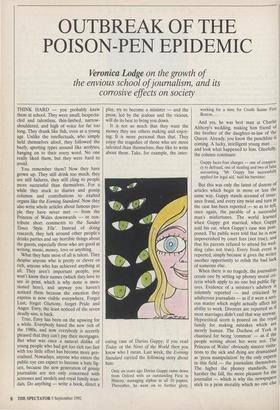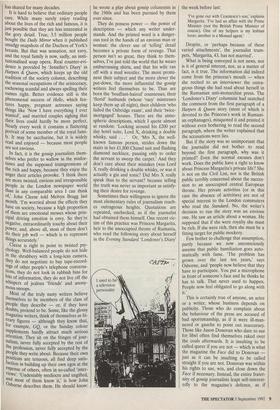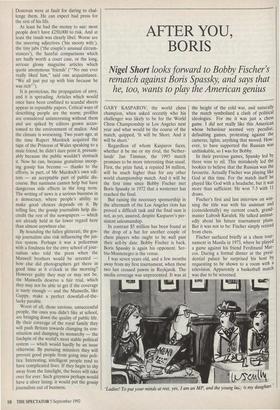OUTBREAK OF THE POISON-PEN EPIDEMIC
Veronica Lodge on the growth of
the envious school of journalism, and its corrosive effects on society
THINK HARD — you probably knew them at school. They were small, bespecta- cled and talentless, thin-limbed, narrow- shouldered, and high of voice for far too long. They drank like fish, even at a young age. Unlike the intellectuals, who simply held themselves aloof, they followed the beefy, sporting types around like acolytes, hanging on to their every word. No one really liked them, but they were hard to avoid.
You remember them? Now they have grown up. They still drink too much, they are still failures, they still cling to people more successful than themselves. For a while they stuck to diaries and gossip columns and contributions to exalted organs like the Evening Standard. Now they also write whole articles about famous peo- ple they have never met — from the Princess of Wales downwards — or con- tribute short comments to the Sunday Times 'Style File'. Instead of doing research, they lurk around other people's drinks parties and say horrible things about the guests, especially those who are good at writing, music, money, love or anything.
What they hate most of all is talent. They despise anyone who is pretty or clever or rich, anyone who has achieved anything at all. They aren't important people, you won't know their names (which they love to see in print, which is why none is men- tioned here), and anyway you haven't noticed them because the emotion they express is now visible everywhere. Forget Lust, forget Gluttony, forget Pride and Anger. Envy, the least noticed of the seven deadly sins, is back.
True, Envy has been on the upswing for a while. Everybody hated the new rich of the 1980s, and now everybody is secretly pleased that they can't pay their mortgages. But what was once a natural dislike of young people who had got too rich too fast with too little effort has become more gen- eralised. Nowadays, anyone who enters the public eye can expect to become a hate fig- ure, because the new generation of gossip journalists are not only concerned with actresses and models and royal family scan- dals. Do anything — write a book, direct a play, try to become a minister — and the press, led by the jealous and the vicious, will do its best to bring you down.
It is not so much that they want the money they see others making and enjoy- ing. It is more personal than that. They enjoy the tragedies of those who are more talented than themselves; they like to write about them. Take, for example, the inter-
esting case of Darius Guppy; if you read Today or the News of the World then you know who I mean. Last week, the Evening Standard carried the following story about him: Only six years ago Darius Guppy came down from Oxford with an outstanding First in History, managing alphas in all 10 papers. Thereafter, he went on to further glory,
working for a time for Credit Suisse First Boston .
And yes, he was best man at Charlie Althorp's wedding, making him friend of the brother of the daughter-in-law of the Queen. Already, you know the punchline is coming. A lucky, intelligent young man .. • and look what happened to him. Gleefully, the column continues:
Guppy faces four charges — one of conspira- cy to defraud, one of stealing and two of false accounting. `Mr Guppy has successfully applied for legal aid,' said his barrister.
But this was only the latest of dozens of articles which begin in more or less the same way. Guppy stands accused of insur- ance fraud, and every tiny twist and turn in the case has been reported — so as to tell, once again, the parable of a successful man's misfortunes. The world learned when Guppy got married, when GupPY sold his car, when Guppy's case was post- poned. The public were told that he is now impoverished by court fees (not true), and that his parents refused to attend his wed- ding (also not true). Every fresh event is reported, simply because it gives the writer another opportunity to relish the bad luck of someone else.
When there is no tragedy, the journalists create one by setting up phoney moral cri- teria which apply to no one but public fig- ures. Evidence of a minister's adultery is solemnly reported — and criticised by adulterous journalists — as if it were a seri- ous matter which might actually affect his ability to work. Divorces are reported as if most marriages didn't end that way anyway. Hypocritical scorn is poured on the royal family for making mistakes which are merely human. The Duchess of York is chastised for being 'common' — as if the people writing about her were not. The Princess of Wales' obviously sincere visita- tions to the sick and dying are dramatised as 'press manipulation' by the only experts in this field — the journalists themselves. The higher the phoney standards, the harsher the fall, the more pleasure for the journalist — which is why the newspapers stick to a prim morality which no one else has shared for many decades. It is hard to believe that ordinary people care. While many surely enjoy reading about the lives of the rich and famous, it is Just possible that they are less interested in the gory detail. True, 3.5 million people bought the Daily Mirror when it published smudgy snapshots of the Duchess of York's breasts. But that was sensation, not envy, and the royal family is now, sadly, an insti- tutionalised soap opera. Real counter-evi- dence is provided by 'Jennifer's Diary' in Harpers & Queen, which keeps up the old tradition of the society column, describing the seasonal occupations of the aristocracy, eschewing scandal and always spelling their names right. Better evidence still is the phenomenal success of Hello, which fea- tures happy, pregnant actresses saying things like 'Now I have everything I ever wanted', and married couples sighing that their lives could hardly be more perfect. Nearly every week it contains a flattering portrait of some member of the royal fami- ly. It may be saccharine, but it is widely read and enjoyed — because most people are not envious.
In fact, it is the gossip journalists them- selves who prefer to wallow in the misfor- tunes and the supposed transgressions of the rich and happy, because they enjoy the anger their articles provoke. `I think there are more twisted, envious and irresponsible people in the London newspaper world than in any comparable area I can think of,' John Cleese told Melvyn Bragg last month. 'I'm worried about the effects they have on society, because a high proportion of them are emotional messes whose prin- cipal driving emotion is envy. So they're negative, extraordinarily touchy about their Power, and, above all, most of them don't do their job well — which is to represent things accurately.' Cleese is right to point to twisted psy- chology. Well-balanced people do not hide in the shrubbery with a long-lens camera, they do not negotiate to buy tape-record- ings of other people's telephone conversa- tions, they do not look in rubbish bins for bits of information, they do not live off the Whispers of jealous 'friends' and anony- mous snoops. Most of the truly nasty writers believe themselves to be members of the class of people they describe — or, if they have doubts, pretend to be. Some, like the glossy magazine writers, think of themselves as lit- erary figures — although they know that, for example, GQ, or the Sunday colour supplements hardly attract much serious attention. They sit on the fringes of jour- nalism, never fully accepted by the rest of the profession, never fully accepted by the People they write about. Because their own Positions are tenuous, all find deep satis- faction in building up their own egos at the expense of others, often in so-called Inter- views'. `Undeniably mediocre and ungifted, and most of them know it,' is how John Osborne describes them. He should know: he wrote a play about gossip columnists in the 1960s and has been pursued by them ever since.
They do possess power — the power of description — which any writer under- stands. And the printed word is a danger- ous tool in the hands of an envious man or woman: the clever use of 'telling' detail becomes a private form of revenge. That person isn't so great, they think to them- selves, I've just told the world that he wears embarrassing shirts, and that his wife ran off with a mud wrestler. The more promi- nent their subject and the more clever the put-down, the more influential the gossip writers feel themselves to be. Thus are born the 'bouffant-haired' countesses, their `florid' husbands (whose 'racy' mistresses keep them up all night), their children 'who failed the Oxbridge exam', and their 'twice- mortgaged' houses. There are the atmo- spheric descriptions, which I quote almost at random: 'Looking around his £200 per day hotel suite, Lord X, drinking a double whisky, said . . . ' Or, 'Mrs X, the well- known famous person, strides down the stairs in her £1,800 Chanel suit and flashing diamond necklace, pausing only to order the servant to sweep the carpet.' And they don't care about their mistakes (was Lord X really drinking a double whisky, or was it actually a gin and tonic? Did Mrs X really speak thus to the servant? because telling the truth was never as important as satisfy- ing their desire for revenge.
Sometimes their willingness to ignore the most elementary rules of journalism reach- es outrageous heights. Quotations are repeated, unchecked, as if the journalist had obtained them himself. One recent vic- tim of this practice was Princess Margarita, heir to the unoccupied throne of Rumania, who read the following story about herself in the Evening Standard 'Londoner's Diary' the week before last:
Tye gone out with Ceausescu's son,' explains Margarita. 'I've had an affair with the Prime Minister (not the British Prime Minister of course). One of my helpers is my lesbian lover, another is a Mossad agent.'
Despite, or 'perhaps because of these varied attachments', the journalist trum- pets, 'Margarita, 43, has not married'.
What is being conveyed is not news, nor is it of general interest, nor, as a matter of fact, is it true. The information did indeed come from the princess's mouth — when she recited to an interviewer the outra- geous things she had read about herself in the Rumanian anti-monarchist press. The `Londoner's Diary' columnist had snatched the comment from the first paragraph of a Harpers & Queen story (most of which is devoted to the Princess's work in Rumani- an orphanages), misquoted it and printed it without even bothering to read the second paragraph, where the writer explained that the accusations were lies.
But if the story was so unimportant that the journalist did not bother to read beyond the first paragraph, why was it printed? Even the normal excuses don't work. Does the public have a right to know about Princess Margarita's private life? She is not on the Civil List, nor is the British public terribly concerned about the succes- sion to an unoccupied central European throne. Her private activities (or in this case the absence of activities) are not of special interest to the London commuters who read the Standard. No, the writer's decision to run the story was an envious one. He saw an article about a woman. He supposed that if she were royalty she must be rich. If she were rich, then she must be a fitting target for public mockery. Few bother to challenge that assumption, partly because we now unconsciously assume that public humiliation goes auto- matically with fame. The problem has grown over the last ten years,' says Osborne, and 'people now believe that they have to participate. You put a microphone in front of someone's face and he thinks he has to talk. That never used to happen. People now feel obligated to go along with it.'
This is certainly true of anyone, an actor or a writer, whose business depends on publicity. Those who do complain about the behaviour of the press are accused of bad sportsmanship, as if it were ill-man- nered or gauche to point out inaccuracy. Those like Jason Donovan who dare to sue for libel often find themselves raked over the coals afterwards. It is insulting to be called queer if you are not — which is what the magazine the Face did to Donovan just as it can be insulting to be called straight if you are not. Donovan was within his rights to sue, win, and close down the Face if necessary. Instead, the entire frater- nity of gossip journalists leapt self-interest- edly to the magazine's defence, as if Donovan were at fault for daring to chal- lenge them. He can expect bad press for the rest of his life.
At least he had the money to sue: most people don't have £250,000 to risk. And at least the insult was clearly libel. Worse are the sneering adjectives ('his snooty wife'), the tiny jabs ('the couple's unusual circum- stances'), the hateful comparisons which are hadly worth a court case, or the long, serious glossy magazine articles which quote anonymous 'friends' (—No one ever really liked him," said one acquaintance. "We all just put up with him because he was rich" ').
It is pernicious, the propagation of envy, and it is spreading. Articles which would once have been confined to scandal sheets appear in reputable papers. Critical ways of describing people are the norm; profiles are considered uninteresting without them and are spiked by editors grown accus- tomed to the environment of malice. And the climate is worsening. Two years ago, at the time Rupert Murdoch acquired the tape of the Princess of Wales speaking to a male friend, he didn't dare print it, presum- ably because the public wouldn't stomach it. Now he can, because gratuitous snoop- ing gossip has become — thanks to the efforts, in part, of Mr Murdoch's own edi- tors — an acceptable part of public dis- course. But nastiness cannot help but have dangerous side effects in the long term. The writing of news is a serious business in a democracy, where people's ability to make good choices depends on it. By telling lies, the gossip journalists help dis- credit the rest of the newspapers — which are already held in far lower regard here than almost anywhere else.
By hounding the fallen glitterati, the gos- sip journalists also risk influencing the jus- tice system. Perhaps it was a policeman with a fondness for the envy school of jour- nalism who told the press when the Maxwell brothers would be arrested how else did photographers get there in good time at 6 o'clock in the morning? However guilty they may or may not be, the Maxwells deserve a fair trial, which they may not be able to get if the coverage is nasty enough — and the Maxwells, like Guppy, make a perfect downfall-of-the- lucky parable.
Worst of all, those envious, unsuccessful people, the ones you didn't like at school, are bringing down the quality of public life. By their coverage of the royal family they will push Britain towards changing its con- stitution and dumping its monarchy — the linchpin of the world's most stable political system — which would hardly be an issue otherwise. By pursuing ministers they will prevent good people from going into poli- tics. Interesting, intelligent people tend to have complicated lives. If they begin to shy away from the limelight, the bores will take over for ever. Such greyness perhaps would have a silver lining: it would put the gossip journalists out of business.




















































 Previous page
Previous page